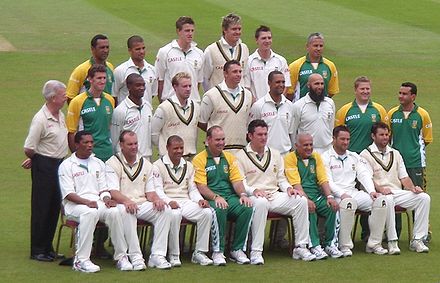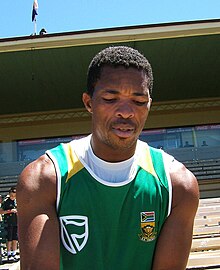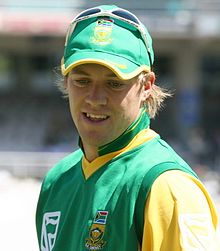South African national cricket team
| South African national cricket team | |
|---|---|
|
Test status received |
1889 |
| First Test - Match |
against England at Port Elizabeth , March 1889 |
| First ODI | against India in Kolkata , November 1991 |
| First T20I | against New Zealand in Johannesburg , October 2005 |
| captain | Faf Du Plessis ( test ), Quinton de Kock ( ODI & T20 ) |
| Coach | Ottis Gibson |
| Official ICC test ranking | 6 of 12 |
| Official ICC ODI ranking | 4 of 20 |
| Official ICC T20I ranking | 5 of 84 |
| World Cup participation | 8th |
| First World Cup | 1992 |
| Best World Cup result | Semi-finals (1992, 1999, 2007, 2015) |
| Champions Trophy participation | 8th |
| First Champions Trophy | 1998 |
| Best Champions Trophy result | Winner (1998) |
| World Twenty20 participations | 6th |
| First World Twenty20 | 2007 |
| Best World Twenty20 result | Semi-finals (2009, 2014) |
| As of May 26, 2020 | |
The South African national cricket team , also known as The Proteas (formerly The Springboks ), represents South Africa internationally in cricket . The national association is called Cricket South Africa .
South Africa is a full member of the International Cricket Council (ICC) and therefore approved for Test Cricket and One-Day Internationals .
In the official world rankings since 2003, South Africa was the leading nation in one-day internationals from February 18 to April 7, 2007 and again from January 30, 2009. In the test of cricket they reached first place on August 24, 2009 and thus became for some time the second nation after Australia to be in first place in both forms of play at the same time.
history

The first tour of an English team to South Africa took place in 1888-1889, when South Africa played its first Test Match in Port Elizabeth, making it the third Test nation.
South Africa celebrated its first victory on January 4, 1906 in Johannesburg against England . They recorded their first away win on January 13, 1911 in Adelaide against Australia.
From March 3 to 14, 1939, the famous timeless test between South Africa and England took place in Durban , which despite its length ended without a winner, i.e. only with a draw. The game could have continued, but the English team wanted to reach Athlone Castle , which was leaving Cape Town on March 17th , as war with Germany seemed increasingly likely.
The Imperial Cricket Conference had decided at its meeting in July 1961 the question of whether South Africa after emerging from the Commonwealth of Nations is to retain his membership in cricket's world governing body reset. In the meantime, matches between South Africa and other member countries would be considered "unofficial tests" but could possibly be recognized as official in retrospect. The series of such unofficial test matches began in early 1962 in South Africa with the team from New Zealand. Australia meanwhile pressed for a decision in the Imperial Cricket Conference , but the general meeting in July 1962 found that the special situation found for South Africa should remain unchanged. A not insignificant aspect in this situation were two ( white ) cricketers who were members of the multi-ethnic team Commonwealth XI ; Neil Adcock and Roy McLean . Both athletes took part in numerous games in various countries except South Africa in 1962. In addition, the South African and Colored Basil D'Oliveira was committed as a professional player in England.
The South African Cricket Board of Control , an institution made up of representatives from all sections of the population , pushed for international recognition to the exclusion of the exclusively “white” South African Cricket Association .
In February and March 1964, the South African team toured Australia and New Zealand . This led to protests from unions and students against the apartheid situation. In Wellington , the wicket was destroyed before play could begin. The manager of the South African team Ken Viljoen was disappointed with the low number of spectators during the stay.
Their greatest success of the pre-boycott era celebrated South Africa in the 1969/1970 season with a superior 4-0 victory in the test series against Australia . In 1970, South Africa was finally excluded from international cricket because of its apartheid policy. Before that, only England, Australia and New Zealand had played against South Africa, while countries like the West Indies and India had boycotted them beforehand. The affair of the native black South African, Basil D'Oliveira, who was competing for England, had a major influence on this decision in 1968, as did strong protests against the tour to England planned for 1970. The tour of Australia at the beginning of 1970 was the last official international tour in South Africa until it was resumed in the ICC.
This decision meant the end of the international career of some of the world's best players such as Graeme Pollock , Barry Richards or Mike Procter . It also resulted in some South Africans later playing for other countries, such as Allan Lamb and Robin Smith who played for England or Kepler Wessels for Australia. The latter became the first captain of South Africa in test matches after their readmission on April 22, 1992 against the West Indies in Barbados .
After the end of apartheid, South Africa was accepted again by the ICC as a test cricket nation in 1991. On November 10, 1991, the first official international match (also their first one-day international ever) took place against India in Calcutta , Clive Rice was their captain.
Famous players of the first decade after 1991 have included the fast bowler Allan Donald , the batsman Gary Kirsten and then as the world's best fielder applicable Jonty Rhodes , perhaps the only player of cricket history, not primarily as a batsman, bowler or Wicket- Keeper became famous.
In the 1990s, as in other sports, South Africa introduced a quota system to give non-white players access to competitive sports.
South African cricket was rocked in April 2000 by a betting scandal in which its captain and batsman Hansie Cronje was particularly involved. On October 11, he was therefore given a life ban. Cronje was killed in a plane crash in South Africa on June 1, 2002.
The first all-black player in South Africa was the almost bowler Makhaya Ntini in 1998 . The team's current captain (2010) is batsman Graeme Smith . Due to a lengthy injury break from Smith, Ashwell Prince was appointed captain in July 2006, making him the first non-white cricket captain in South Africa. Other well-known players are the all-rounder Jacques Kallis , the almost bowler Dale Steyn , the wicket keeper Mark Boucher , the batsman AB de Villiers and the first player of Indian descent, the batsman Hashim Amla .
Tournaments
In tournaments, i. H. in One-Day Internationals and Twenty20 Cricket, South Africa has mostly cut below its capabilities and has earned a reputation for failing at the crucial moment. ("Chokers") Despite some strong performances in the group phases, South Africa has so far only managed to win one game in the knockout phase of a Cricket World Cup tournament.
At the 1992 World Cup , their first tournament after the resumption, they failed in the semi-finals against England. The highly controversial rain rule used in this game , which was not yet based on the Duckworth-Lewis method , is often blamed for this.
At the 1996 World Cup in India / Pakistan / Sri Lanka all five preliminary round games were won, but with the first defeat in the quarter-finals against the West Indies, the end quickly followed.
During the 1999 World Cup in England, Herschelle Gibbs had the mishap in the important second round match against Australia, dropping the ball that had actually already been caught - while trying to throw it up jubilantly - and thus let the Australian captain Steve Waugh continue in the game. He thanked him with a decisive Century , which brought Australia the victory it needed to reach the semi-finals. In this semi-final, both teams met again immediately afterwards. In the last over of the game South Africa gambled away the victory they believed to be safe due to a misunderstanding of their two batsman and only came to a draw, which Australia secured the final participation after the preliminary round results. Australia then also became world champions.
As host of the 2003 Cricket World Cup , South Africa did not get beyond the preliminary round. This was mainly due to a misunderstanding about how many runs the team needed in the last group game against Sri Lanka, as the game was about to be abandoned due to the rain that was on the horizon. South Africa could still win, however, as enough overs had been completed by then to be able to evaluate the game. However, their captain and star all-rounder Shaun Pollock misread the Duckworth-Lewis table and therefore misinformed his two batsman because he believed the target number ( target ) required to win was one less than it actually was. The game was then lost with exactly one run. Pollock then resigned as captain, but played successfully for South Africa for another 5 years.
At the 2007 World Cup in the West Indies, the team failed, after a strong start in the tournament, again to Australia in the semi-finals. With only 149 runs, she achieved her lowest result at world championships in this game.
However, the team won the first ICC Champions Trophy against the West Indies in 1998 and in the same year the only cricket tournament so far at the Commonwealth Games in Malaysia.
South Africa holds the record for the highest successful run chase in One-Day Internationals, when they snatched victory away from Australia on March 12, 2006 in Johannesburg with 438-9 in 49.5 over, i.e. with the penultimate ball. This is also the second highest number of points ever achieved (as of February 2010). The game is now considered to be the best one-day international ever.
Captains
Test match captains
So far, a total of 36 players have acted as captains for South Africa in a test match.
| No. | Surname | Period |
|---|---|---|
| 1 | Owen Dunell | 1889 |
| 2 | William Milton | 1889-1892 |
| 3 | Ernest Halliwell | 1896-1902 |
| 4th | Alfred Richards | 1896 |
| 5 | Murray Bisset | 1899 |
| 6th | Henry Taberer | 1902 |
| 7th | James Henry Anderson | 1902 |
| 8th | Percy Sherwell | 1906-1911 |
| 9 | Sibley John Snooke | 1910 |
| 10 | Frank Mitchell | 1912 |
| 11 | Louis Tancred | 1912 |
| 12 | Herbert Taylor | 1913-1924 |
| 13 | Hubert Deane | 1927-1931 |
| 14th | Eiulf Peter Nupen | 1930 |
| 15th | Horace Cameron | 1931-1932 |
| 16 | Herbert Wade | 1935-1936 |
| 17th | Alan Melville | 1938-1947 |
| 18th | Arthur Nourse | 1948-1951 |
| 19th | Jack Cheetham | 1952-1955 |
| 20th | Derrick McGlew | 1955-1962 |
| 21st | Clive van Ryneveld | 1956-1958 |
| 22nd | Trevor Goddard | 1963-1965 |
| 23 | Peter van der Merwe | 1965-1967 |
| 24 | Aron Bacher | 1970 |
| 25th | Kepler Wessels | 1992-1994 |
| 26th | Hansie Cronje | 1994-2000 |
| 27 | Gary Kirsten | 1998 |
| 28 | Shaun Pollock | 2000-2003 |
| 29 | Mark Boucher | 2002 |
| 30th | Graeme Smith | 2003-2014 |
| 31 | Jacques Kallis | 2006-2009 |
| 32 | Ashwell Prince | 2006 |
| 33 | Hashim Amla | 2014-2016 |
| 34 | AB de Villiers | 2015-2016 |
| 35 | Faf du Plessis | 2016 – today |
| 36 | Dean Elgar | 2017-2019 |
Stages
The South African team has so far used 11 stadiums on home soil for hosting friendly matches:
| No. | Stadion | city | First use |
|---|---|---|---|
| 1 | St George's Park | Port Elizabeth | March 12, 1889 |
| 2 | Newlands | Cape Town | March 25, 1889 |
| 3 | Old Wanderers | Johannesburg | March 2, 1896 |
| 4th | Lord's | Durban | January 21, 1910 |
| 5 | Kingsmead | Durban | January 18, 1923 |
| 6th | Ellis Park | Johannesburg | December 27, 1948 |
| 7th | The Wanderers | Johannesburg | December 24, 1956 |
| 8th | SuperSport Park | Centurion | November 16, 1995 |
| 9 | Chevrolet Park | Bloemfontein | October 29, 1999 |
| 10 | Buffalo Park | East London | October 18, 2002 |
| 11 | Senwes Park | Potchefstroom | October 25, 2002 |
Balance sheet
The team has the following results against the other full members of the ICC in Test, ODI and Twenty20 cricket ( as of August 1, 2020 ).
| opponent | Testing | ODIs | Twenty20s | ||||||||||||
|---|---|---|---|---|---|---|---|---|---|---|---|---|---|---|---|
| Sp. | S. | U | N | N | Sp. | S. | U | N | NO | Sp. | S. | U | N | NO | |
|
|
0 | 0 | 0 | 0 | 0 | 1 | 1 | 0 | 0 | 0 | 2 | 2 | 0 | 0 | 0 |
|
|
98 | 26th | 0 | 52 | 20th | 103 | 51 | 3 | 48 | 1 | 21st | 8th | 13 | 0 | 0 |
|
|
12 | 10 | 0 | 0 | 3 | 21st | 17th | 0 | 4th | 0 | 6th | 6th | 0 | 0 | 0 |
|
|
153 | 34 | 0 | 64 | 55 | 63 | 30th | 1 | 28 | 4th | 18th | 9 | 8th | 0 | 1 |
|
|
39 | 15th | 0 | 14th | 10 | 84 | 46 | 0 | 35 | 3 | 15th | 6th | 9 | 0 | 0 |
|
|
0 | 0 | 0 | 0 | 0 | 5 | 5 | 0 | 0 | 0 | 0 | 0 | 0 | 0 | 0 |
|
|
45 | 25th | 0 | 4th | 16 | 71 | 41 | 0 | 25th | 5 | 15th | 11 | 4th | 0 | 0 |
|
|
26th | 15th | 0 | 4th | 7th | 79 | 50 | 0 | 28 | 1 | 14th | 8th | 6th | 0 | 0 |
|
|
9 | 8th | 0 | 0 | 1 | 41 | 38 | 0 | 2 | 1 | 5 | 5 | 0 | 0 | 0 |
|
|
29 | 14th | 0 | 9 | 6th | 77 | 44 | 0 | 31 | 0 | 13 | 7th | 5 | 0 | 0 |
|
|
28 | 18th | 0 | 3 | 7th | 62 | 44 | 1 | 15th | 2 | 10 | 6th | 4th | 0 | 0 |
International tours
Since its full member status in the ICC, South Africa has been on bilateral tours against the other full members and other members of the ICC with ODI and Twenty20 status.
International tournaments
World cricket championship
- 1975 Not allowed to start
- 1979 Not allowed to start
- 1983 Not allowed to start
- 1987 Not allowed to start
- 1992 semi-finals
- 1996 quarter-finals
- 1999 semi-finals
- 2003 preliminary round
- 2007 semi-finals
- 2011 quarter finals
- 2015 semi-finals
- 2019 preliminary round
Champions Trophy
- 1998 winner
- 2000 semifinals
- 2002 semi-finals
- 2004 preliminary round
- 2006 semi-finals
- 2009 preliminary round
- 2013 semifinals
- 2017 preliminary round
World Twenty20
Notes and sources
- ↑ The South African national rugby team is still called that today.
- ↑ Timeless Test - Cricinfo
- ↑ a b SAIRR : A Survey of Race Relation 1962 . Johannesburg 1963, p. 220.
- ↑ SAIRR: A Survey of Race Relation 1964 . Johannesburg 1965, p. 344.
- ^ First test match after the end of apartheid
- ^ Quota System Telegraph.co.uk
- ^ Lifelong ban on Hansie Cronje
- ↑ Hansie Cronje - Plane Crash
- ↑ The time period refers to the corresponding cricket season in which the first or last game of the time as captain took place
- ↑ Records / South Africa / Test Matches / Result Summary ( English ) Cricinfo. January 29, 2013. Accessed July 31, 2020.
- ↑ Records / South Africa / One-Day Internationals / Result Summary ( English ) Cricinfo. Accessed July 31, 2020.
- ↑ Records / South Africa / Twenty20 Internationals / Result Summary ( English ) Cricinfo. Accessed July 31, 2020.



